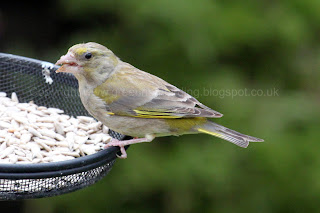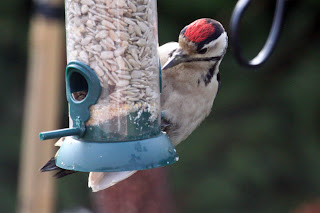Red Kites have even been known to take children's cuddly toys from gardens in this area, after confusing them for small mammals!
Monday, 20 August 2012
Red Kite Hunting
Grass cutting in the field adjacent to West Wood, Newbury this afternoon attracted two Red Kites who were hunting for wood mice and rabbits. One of the birds landed at one point.
Friday, 17 August 2012
Coal Tit Returns
A Coal Tit is significantly smaller than a great tit and with subtly different colours. There is a white middle part to the back of a Coal Tit's head and it's breast is a soft chestnut colour.
I caught this one feeding from our Sunflower Hearts feeder, but he is also partial to our Fat Balls.
I caught this one feeding from our Sunflower Hearts feeder, but he is also partial to our Fat Balls.
Green Woodpecker Close Encounter
The large numbers of ants in our lawn have attracted quite a few Green Woodpeckers in the last few weeks, but there was a close encounter this week when one of the birds came right close to the window, so close in fact I was amazed it didn't freak out when it saw me, as Green Woodpeckers are notoriously shy and will make a hasty retreat when anything or anybody disturbs them.
Click this picture to see the detail in it!
Click this picture to see the detail in it!
Thursday, 9 August 2012
Attracting Rare Birds to your Garden
 Whether or not you can attract rare or uncommon birds to your garden comes down to the proximity of nearby woodland and open space and the type of food you put out. Here in Greenham we have around a 1000 acres of open space and woodland at Greenham Common and nearby West Wood, so we're spoilt!
Whether or not you can attract rare or uncommon birds to your garden comes down to the proximity of nearby woodland and open space and the type of food you put out. Here in Greenham we have around a 1000 acres of open space and woodland at Greenham Common and nearby West Wood, so we're spoilt!It has become really apparent over many months of experimentation that the best combinations of food for attracting some of the rarer garden birds are:
- Suet balls (aka fat balls) for Great Spotted Woodpecker
- Sunflower hearts for Nuthatch, Bullfinch and Greenfinch as well as Blue Tit and Great Tit
- Nyjer for Goldfinch, Bullfinch (surprisingly) and Greenfinch
- Peanuts for Great Spotted Woodpecker, and Nuthatch + Great Tit, Blue Tit
Monday, 6 August 2012
Great Spotted Woodpecker
The better lighting conditions of the summer have allowed us to take some amazing pictures of the Great Spotted Woodpeckers which frequent our garden from nearby Greenham Common and West Wood, south east of Newbury.
As well as the male pictured (right) there are two juveniles which fight if they arrive at the same time!
The lower of the three pictures is the juvenile which is nearly the size of the adult, but is distinguishable by its red cap and more freckly back parts.
The adult Great Spotted Woodpecker will also defend its territory from the juveniles, even though we suspect that they are its own young. Presumably it thinks they should fend for themselves now and move to a different territory and find their own food!
Top two pictures - taken with Canon EOS500D SLR, ISO400, Canon EF 100-400mm Zoom lens at F6.3 and F7.1, 1/500 second exposure.
Bottom picture - taken with Canon EOS500D SLR, ISO800, Canon EF 100-400 lens at F6.3 1/320 second exposure.
As well as the male pictured (right) there are two juveniles which fight if they arrive at the same time!
The lower of the three pictures is the juvenile which is nearly the size of the adult, but is distinguishable by its red cap and more freckly back parts.
The adult Great Spotted Woodpecker will also defend its territory from the juveniles, even though we suspect that they are its own young. Presumably it thinks they should fend for themselves now and move to a different territory and find their own food!
Top two pictures - taken with Canon EOS500D SLR, ISO400, Canon EF 100-400mm Zoom lens at F6.3 and F7.1, 1/500 second exposure.
Bottom picture - taken with Canon EOS500D SLR, ISO800, Canon EF 100-400 lens at F6.3 1/320 second exposure.
Juvenile Bullfinches
Whilst we've not seen the pair of bullfinches recently, these two juveniles turned up on our seed tray the other morning.
These birds are still to acquire the beautiful plumage of the adults, and OK they look a little drab in comparison, not helped by having soaked feathers as it had just been a heavy shower.
Bullfinches have become increasingly rare over the last few years due to persecution, following their unfortunate habit of stripping the buds off fruit trees in the Spring. We have witnessed this destructive behaviour on a mature apple tree opposite our house in February each year.
Ironically the picture (right) shows the young Bullfinch sat on our Apple Tree, presumably eyeing it up for next Spring's bud-feast!
These birds are still to acquire the beautiful plumage of the adults, and OK they look a little drab in comparison, not helped by having soaked feathers as it had just been a heavy shower.
Bullfinches have become increasingly rare over the last few years due to persecution, following their unfortunate habit of stripping the buds off fruit trees in the Spring. We have witnessed this destructive behaviour on a mature apple tree opposite our house in February each year.
Ironically the picture (right) shows the young Bullfinch sat on our Apple Tree, presumably eyeing it up for next Spring's bud-feast!
Characterful Jays
There's no doubt that Jays are not only one of the most stunning garden birds, they are also full of character and are highly amusing to watch as they cunningly plan their next move.
This one has already started preparing for winter by finding places to stash peanuts from our seed tray. Over a few days he has got more daring and even sit right next to the house window peering in!
There are little holes in the ground where the nuts are placed. Question is - will it remember where they are when food is more scarce over the winter months?
For any budding photographers, these stunning photographs were taken on our budget Canon EOS500D SLR camera at ISO800 with the Canon 100-400mm EF IS lens at F7.1, 1/1000sec exposure. The lens cost twice as much as the camera, but this shows that lens quality makes all the difference!
This one has already started preparing for winter by finding places to stash peanuts from our seed tray. Over a few days he has got more daring and even sit right next to the house window peering in!
There are little holes in the ground where the nuts are placed. Question is - will it remember where they are when food is more scarce over the winter months?
For any budding photographers, these stunning photographs were taken on our budget Canon EOS500D SLR camera at ISO800 with the Canon 100-400mm EF IS lens at F7.1, 1/1000sec exposure. The lens cost twice as much as the camera, but this shows that lens quality makes all the difference!
Wednesday, 1 August 2012
Bad Feather Day
It is always interesting to see the reduction in food taken during days when the Sparrowhawk visits!
Also goes to show that birds or prey can have the equivalent of a bad hair day - let's call it a 'bad feather day'!
Subscribe to:
Comments (Atom)











